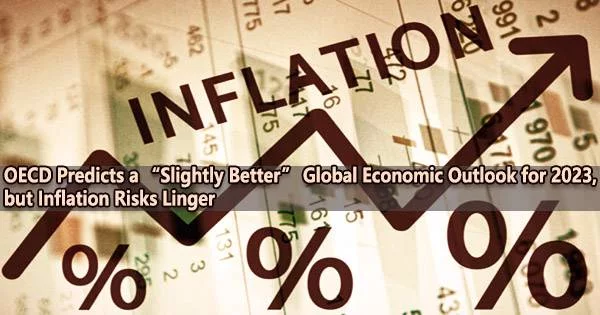The global economic outlook is “slightly brighter” this year, according to OECD Secretary-General Mathias Cormann, but inflation problems persist.
“The outlook for the world is slightly brighter at the beginning of 2023 than what we thought it would be just two or three months ago,” he told CNBC’s “Street Signs Asia” on Friday.
“Indeed, energy and food prices are substantially lower than what they were at their peaks,” noted the OECD chief, ahead of a G-20 financial leaders meeting this week in Bengaluru, India.
Because Europe was able to “”successfully” diversify its energy sources, energy prices have decreased dramatically, according to Cormann. In addition, a “benign winter” helped to reduce energy demand which kept gas prices low, he said.
In November, the OECD said “Russia’s war of aggression against Ukraine has provoked a massive energy price shock not seen since the 1970s.”
“The global economy is projected to grow well below the outcomes expected before the war at a modest 3.1% this year 2022, before slowing to 2.2% in 2023 and recovering moderately to a still sub-par 2.7% pace in 2024,” it added.
Over the medium to longer term, this is a very much a positive in terms of making sure that the supply chains function more efficiently and more effectively, making sure that demand in China and indeed trade more generally resumes in a more positive pattern.
OECD Secretary-General Mathias Cormann
In addition, the paper noted that as Europe and the United States experience strong slowdowns, Asian emerging-market countries are anticipated to contribute for about three-quarters of global GDP growth in 2023.
Inflation risks
Still, inflation risks continue to persist and need to be tackled well, said the OECD chief.
“Inflation is starting to tick down, but we are not on top of the inflation challenge yet. There is more work to be done to tackle inflation and that comes with risks,” noted Cormann. “And these are risks that will need to continue to be managed well over the weeks and months.”
The OECD chief highlighted the U.S. Federal Reserve took “aggressive action last year,” in terms of hiking interest rates to rein in surging price pressures.
Now the Fed continues to fight inflation in “a more steady fashion allowing the data to come through and allowing… the measures that are in the pipeline to take effect,” Cormann noted. “That is what we expect central banks around the world to do, to continue to monitor the data and to continue to adjust the decisions.”
In early February, the U.S. central bank raised its benchmark interest rate by a quarter percentage point and gave little indication it is nearing the end of this hiking cycle.
The head of the OECD stated last month that China’s reopening is “overwhelmingly positive” in the effort to combat the world’s rising inflation. In early December, Beijing suddenly shifted away from its zero-Covid policy.
“Over the medium to longer term, this is a very much a positive in terms of making sure that the supply chains function more efficiently and more effectively, making sure that demand in China and indeed trade more generally resumes in a more positive pattern,” Cormann told CNBC at the World Economic Forum in Davos, Switzerland.
















